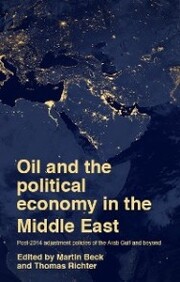Detailansicht
Oil and the political economy in the Middle East
eBook - Post-2014 adjustment policies of the Arab Gulf and beyond
ISBN/EAN: 9781526149084
Umbreit-Nr.: 5131584
Sprache:
Englisch
Umfang: 296 S.
Format in cm:
Einband:
Keine Angabe
Erschienen am 17.08.2021
Auflage: 1/2021
E-Book
Format: EPUB
DRM: Adobe DRM
- Zusatztext
- <p>The downhill slide in the global price of crude oil, which started mid-2014, had major repercussions across the Middle East for net oil exporters, as well as importers closely connected to the oil-producing countries from the Gulf. Following the Arab uprisings of 2010 and 2011, the oil price decline represented a second major shock for the region in the early twenty-first century one that has continued to impose constraints, but also provided opportunities. Offering the first comprehensive analysis of the Middle Eastern political economy in response to the 2014 oil price decline, this book connects oil market dynamics with an understanding of socio-political changes.<br><br>Inspired by rentierism, the contributors present original studies on Bahrain, Egypt, Jordan, Kuwait, Lebanon, Oman, Qatar, Saudi Arabia, and the United Arab Emirates. The studies reveal a large diversity of country-specific policy adjustment strategies: from the migrant workers in the Arab Gulf, who lost out in the post-2014 period but were incapable of repelling burdensome adjustment policies, to Egypt, Jordan, and Lebanon, who have never been able to fulfil the expectation that they could benefit from the 2014 oil price decline.<br><br>With timely contributions on the COVID-19-induced oil price crash in 2020, this collection signifies that rentierism still prevails with regard to both empirical dynamics in the Middle East and academic discussions on its political economy.</p>
- Kurztext
- This is the first comprehensive analysis of the Middle East political economy in response to the oil price decline in 2014. Based on a heuristic framework inspired by rentierism, the volume contains original studies on Bahrain, Egypt, Jordan, Kuwait, Lebanon, Oman, Qatar, Saudi Arabia, and the United Arab Emirates.
- Autorenportrait
- <p>Martin Beck is Professor of Modern Middle East Studies at the University of Southern Denmark (SDU)<br><br>Thomas Richter is a Senior Research Fellow at the German Institute for Global and Area Studies (GIGA)</p>
